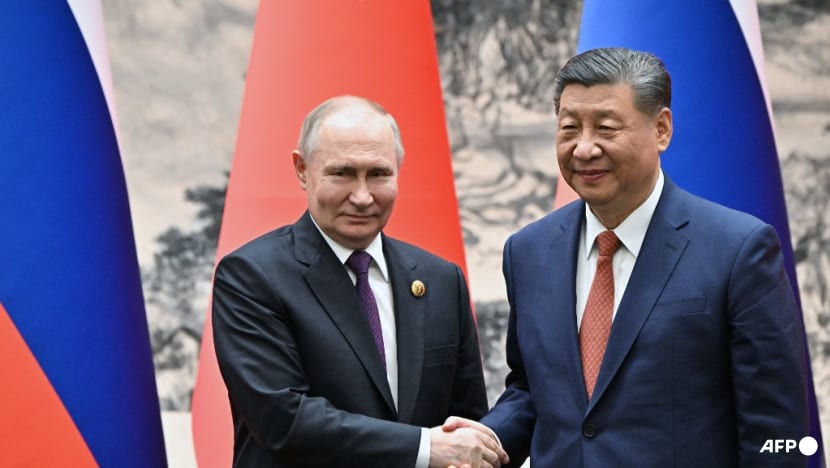There are clearly limits to China and Russia’s ‘no limits’ partnership: Analysts
Aside from limits, the Sino-Russian partnership is not one that is among equals, with Beijing holding the upper hand, analysts say.


This audio is generated by an AI tool.
Russian President Vladimir Putin arrived in Beijing on Thursday (May 16) for talks with his “dear friend” Chinese President Xi Jinping, as Moscow seeks to deepen ties with its most powerful ally.
This is Putin’s first overseas trip since he was sworn in for a fifth term last week, and his second to China in less than a year.
The two countries have touted their relationship as one of “no-limits” since February 2022 in a bid to unite against the global influence of the United States.
But clearly, there are limits, said observers.
Moscow has been relying on Beijing for backing as it faces increasing pressure and heavy sanctions from the West over its invasion of Ukraine.
But Chinese banks, fearing retaliation from Washington that might cut them off from the global financial system, have begun to pull back from Russia-related transactions.
“Such self-imposed restrictions highlight the ambiguity that surrounds Chinese standing on (the war in Ukraine),” said Alexey Muraviev, an associate professor of national security and strategic studies at Curtin University.
“While the Chinese do not condemn Russia's actions, they are not openly supporting Russia either. The fact that Beijing doesn't unconditionally back Russia – the way North Korea does – is a demonstration of such limits in their relationship,” he told CNA’s Asia Now.
Muraviev added that similarly, Moscow has its own limits beyond symbolic statements over how far it is prepared to support Beijing over geopolitical disputes, including tensions in the South China Sea.
“While we may be hearing a lot about their limitless friendship, that doesn't mean unconditional alliances. They've got individual political agendas, which may not necessarily reflect or be in the interests of the other party,” he said.
AN UNEQUAL RELATIONSHIP
Aside from limits, the Sino-Russian partnership is not one that is among equals, with Beijing holding the upper hand, analysts said.
“Xi may have told Putin this would be a friendship without limits. But it's very much not a friendship between equals … and this makes it very uncomfortable for Russia,” said international relations Professor Aurel Braun from the University of Toronto’s Department of Political Science.
Russia has become increasingly dependent on China for its economy as it struggles under the weight of Western sanctions. China is Russia’s biggest trading partner, in both imports and exports.
In return, Russia could have military technology that China is interested in – the White House said in February that Russia has an emerging anti-satellite weapon.
“The Russians are at the cutting edge of certain high-level, hypersonic and anti-satellite technology… technology that is worrying the West. China wants that technology because if it should engage in conflict with Taiwan, it would like to damage America’s satellite ability as much as possible,” Braun said.
“Russia is in less and less of a position to refuse to transfer that technology. It needs Chinese support and Chinese goods. As Russian dependence increases, China may feel more confident in manipulating, leveraging or pressuring Russia.”
BENEFITS AND RISKS
During Putin’s two-day visit, both leaders are expected to focus on trade, energy and security issues, including Ukraine.
Experts said China faces an increasingly tricky balancing act as while there are benefits to maintaining sound ties, there are clear risks as well.
Xi last week returned from a three-nation tour of Europe seen as a charm offensive on the back of a sluggish economy back home and high tariffs from the US.
“A relationship (with Europe) remains quite vital for China, and its ties with Russia can endanger that,” said Braun.
He added that Russia could become a problematic ally if Moscow continues to expect Beijing's help to boost its economy or extend political support at the United Nations.
Yet, analysts expect Putin’s current visit to be purely symbolic and likely to yield little significant outcome.
Dr Samir Puri, associate fellow at British think tank Chatham House, said that it is unlikely the visit would complicate things further or undo Xi’s recent efforts in Europe.
“Ultimately, the US’ perceptions of rivalry with China have a momentum of their own. This visit won’t tell critics anything they didn't already think or feel about China,” he said.
CHINA PLAYS CRUCIAL ROLE IN UKRAINE WAR
Its relationship with Moscow allows Beijing to play a crucial role in resolving the conflict in Ukraine, said observers.
Ahead of his visit, Putin expressed support for China's 12-point peace plan, a shift from his lukewarm response when it was first proposed in February last year.
Puri said the Kremlin could be more agreeable at bringing the conflict to an end – albeit still on its terms – now that it has gained some ground.
“There's a window of opportunity for Russia, both militarily and diplomatically, to strengthen its position before US-funded weapons arrive in Ukraine,” he told CNA938.
The US Congress last month approved a long delayed US$61 billion aid package for Ukraine that includes air defence, artillery rounds, armoured vehicles and anti-tank weapons.
Depleted Ukrainian ranks have emboldened Russian forces to make recent gains in Ukraine’s northeastern region.
While Kyiv has said it wants to push Russian forces out completely and retake all its territory including Crimea, experts said success is looking increasingly unlikely.
Puri, who is also a visiting lecturer at the King's College London’s Department of War Studies, added that amid heightened tensions between Russia and the West, Asian powers – principally China – are in prime position to negotiate a peace deal.
“Ukraine is fighting a desperate war. Who can help talk the Russians down from the aggressive actions that they're taking? China – and potentially India – may be able to exert some kind of positive pressure on Russia to bring things to a stop,” he said.
















